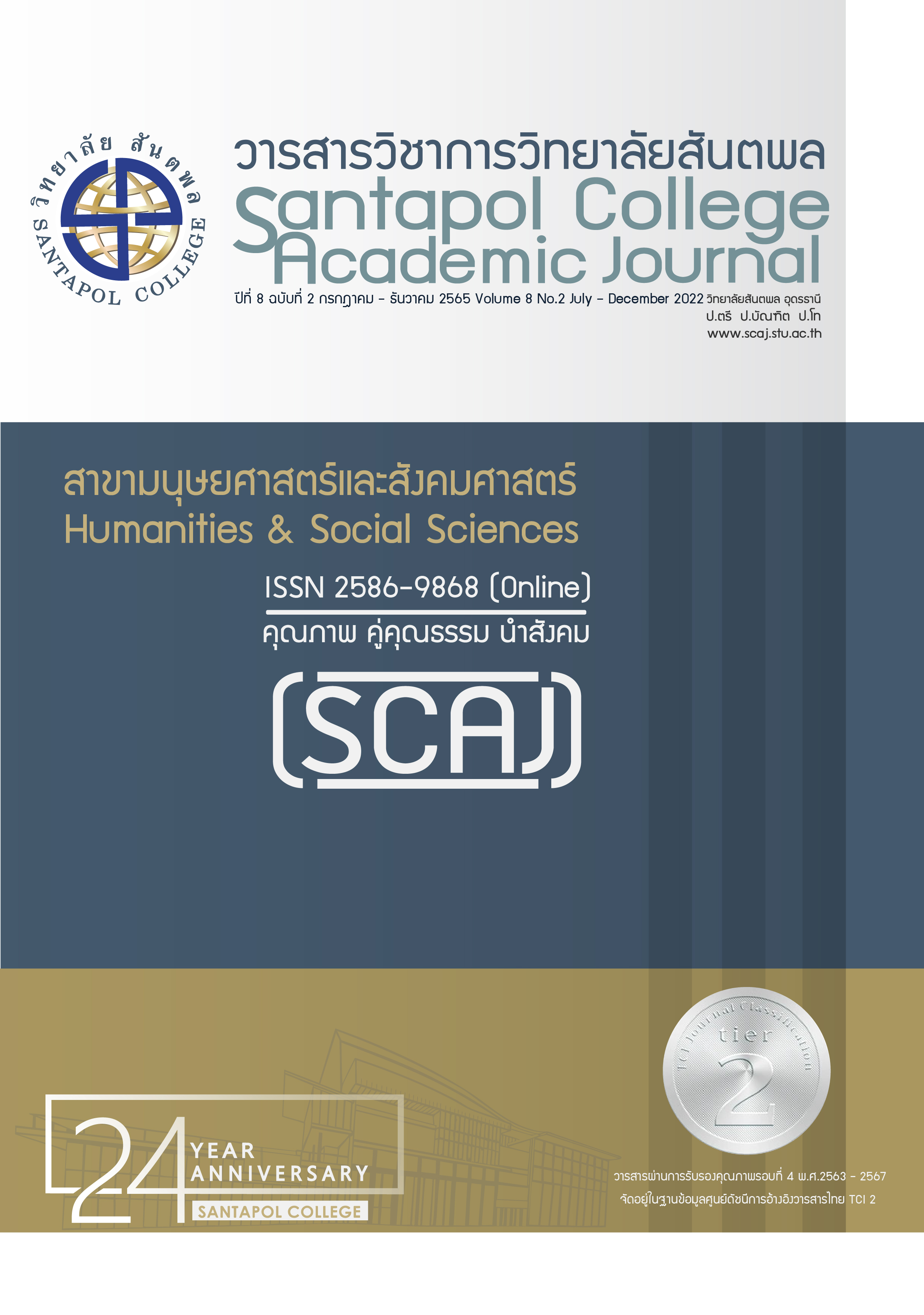PRAGMATIC STRATEGIES USED BY THAI UNDERGRADUATE STUDENTS IN AN ELF PERSPECTIVE: A CASE STUDY OF ENGLISH MAJOR STUDENTS
Main Article Content
บทคัดย่อ
This qualitative research aims at investigate how Thai undergraduate students communicate with interlocutors who have different L1 by using pragmatic strategies so as to reach successful communication. The 12 participants selected by using purposive and snowball sampling techniques were 8 Thai undergraduate students majoring in English and 4 foreigners, having group discussions on topics selected by the researchers. Due to the COVID-19 situation, the discussions were video recorded with their permission, and the spoken discourse was transcribed into text based on the VOICE transcription conventions (2007). A content analysis approach was used to analyze the collecteddataby coding and categorizing into themes and sub-themes.
The results showed thatthe participants employed a variety of strategies including code-switching,
self-repetition, self-initiated repair, appeal for help, confirmation check, backchannel, lexical anticipation,
and flow-keepers. It is concluded that pragmatic strategies should be consciously taken into account, and an awareness of using them appropriately should be raised because those pragmatic strategies cannot only solve misunderstanding problems or communicative breakdowns but also enhance successful communication in
daily-basis conversations among any English users.
Article Details

อนุญาตภายใต้เงื่อนไข Creative Commons Attribution-NonCommercial-NoDerivatives 4.0 International License.
เนื้อหาและข้อมูลในบทความที่ลงตีพิมพ์ในวารสารวิชาการวิทยาลัยสันตพล ถือว่าเป็นข้อคิดเห็นและความรับผิดชอบของผู้เขียนบทความโดยตรง ซึ่งกองบรรณาธิการวารสารไม่จำเป็นต้องเห็นด้วยหรือรับผิดชอบใดๆ
เอกสารอ้างอิง
Baker, W. (2012). English as a Lingua Franca in Thailand: characteristics and implications. Englishes in Practice, 1(1), 1-10.
Cogo, A. (2009). Accommodating difference in ELF Conversation:A study of pragmatic Strategies. Retrieved December 20, 2021, from https://www.researchgate.net/publication/313247453_Accommodating_difference_in_ELF_Conversations_A_study_of_pragmatic_strategies.
Cogo, A. (2010). Strategic use and perceptions of English as a Lingua Franca. Poznan Studies in Contemporary Linguistics, 46(3), 295–312. https://doi.org/10.2478/v10010-010-0013-7.
Cogo, A., & Dewey, M. (2012). Analysing English as a Lingua Franca: A Corpus-driven Investigation. London: Continuum.
Cogo, A., & House, J. (2017). Intercultural Pragmatics. In A. Barron, Y. Gu, & G. Steen (Eds.), The Routledge Handbook of Pragmatics (pp. 168–183). Oxon: Routledge.
Cogo, A., & Pitzl, M. L. (2016). Pre-empting and signalling non-understanding in ELF. ELT Journal, 70(3), 339–345. https://doi.org/10.1093/elt/ccw015.
Crystal, D. (2003). English as a Global Language. (2nd ed.). Cambridge University Press. https://doi.org/10.1017/CBO9780511486999.
Deterding, D. (2013). Misunderstanding in English as a Lingua Franca: An Analysis of ELF Interactions inSouth-East Asia (J. Jenkins & W. Baker, Eds.). De Gruyter Mouton.
Hickey, R. (2019), (December 16). The Colonial and Postcolonial Expansion of English. Cambridge University. The Colonial and Postcolonial Expansion of English (Chapter 2) - The Cambridge Handbook of World Englishes.
Kangasharji, H. (2002). Alignment in disagreement: Forming Oppositional Alliances in Committee Meetings. Journal of Pragmatics. (34), 1447-1471.
Kongsom, T. (2009). The effects of teaching communication strategies on Thai learners of English. University of Southampton, Unpublished Doctoral Thesis.
Kotarputh, R. (2020). Pragmatic Strategies and Politeness in Email Exchanges by Business English as a Lingua Franca (BELF) Users in a Thai Higher Education Setting: Managing Miscommunication, Enhancing Intercultural Communication and Indicating Levels of Formality. University of Southampton. Unpublished Doctoral Thesis.
Lee, K. (2020). Backchannels as a Cooperative Strategy in ELF Communications (p. 258-259) (p. 265-266). http://journal.kasell.or.kr/xml/25048/25048.pdf.
Lichtkoppler, J. (2007). Male. Male. – Male? – The Sex is Male. The role of repetition in English as a Lingua Franca Conversations. Vienna English Working Paper. (16), 39-65.
Mauranen, A. (2006). Signaling and preventing misunderstanding in English as lingua franca communication. International Journal of the Sociology of Language, (177), 123–150. Retrieved January 10, 2022, from https://doi.org/10.1515/ijsl.2006.008.
Mauranen, A., & Ranta, E. (2009). English as a Lingua Franca: Studies and Findings (A. Mauranen & E. Ranta, Eds.). Newcastle upon Tyne: Cambridge Scholars Publishing.
Ollinger, A. (2012). The good ELF user: A qualitative meta-analysis of strategic language use behaviours in English as a lingua franca. (master’s thesis). Universität Wien, Austria. Retrieved December 20, 2021, from https://www.academia.edu/4499546/Communication_strategies_in_ELFfbclid=IwAR02KDr0ICgYlzzhtR1JSIv6CDs1uVDU3Y544SXDF0EalTy1ALoTSIEBtsQ.
Ren, W. (2016a). Pragmatic strategies to solve and preempt understanding problems in Chineseprofessionals’ emails when using English as lingua franca communication. International Journal of Bilingual Education and Bilingualism, 1–14.
Sato, T., Yujobo, Y. J., Okada, T., & Ogane, E. (2019). Communication strategies employed by low-proficiency users: Possibilities for ELF-informed pedagogy. Journal of English as a Lingua Franca, 8(1), 9–35. https://doi.org/10.1515/jelf-2019-2003.
VOICE Project. (2007). VOICE Transcription Conventions [2.1]. Retrieved December 5, 2021, from http://www.univie.ac.at/voice/voice.php?page=transcription_general_information.


